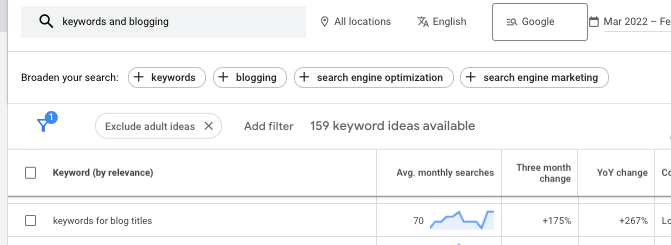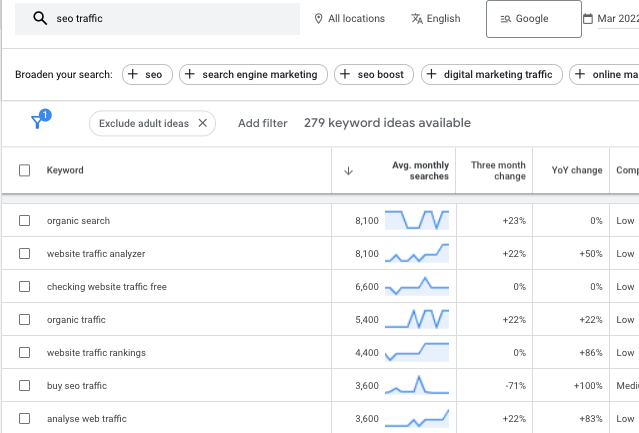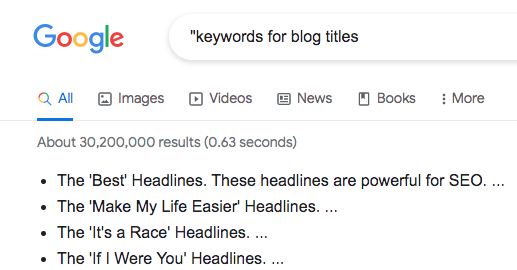There’s a few reasons why you should use keywords for blog titles. As a blogger, you want to attract traffic to your website. Ideally free traffic from blogging. But that doesn’t happen easily and you’ll need to work hard (and smart) for some time before your website is super busy with traffic. In a competitive niche it can take even longer too.

But one way to give yourself more chance of your content ranking on Google (the most popular search engine) is to find long tail keywords with low SEO difficulty.
Short “tail” keywords are two to three word combinations. These are typically much more difficult to rank for because of the huge competition. So instead of writing articles with two or three word titles, look for longer strings of keywords which give you a better chance of getting found on the SERPS – search engines results pages.
To find suitable keywords for blog titles, you can use Google’s free keyword planner tool. You’ll just need an account with Google Adwords to use it.
Why Use Keywords For Blog Titles?
Some say you should find an enticing heading for your article titles which “draws” in visitors when they see your headlines. Many of the most popular articles on the internet use this tactic to get eyes on their content. Checkout Buzzsumo.com for some of the most popular trending pieces of content online to see which articles do the best.

While this can work you also need to get your headline seen first! Which works fine if you’re promoting rabidly on the various social media platforms. But if you’re on a low budget, that can be tough, even with some free tools which help you automate the process.
Using keywords as your blog titles is a different tactic; although the two can cross over occasionally and you can find a good keyword which also is an enticing headline too! With a keyword based headline, you can attract more attention from the SERPS – search engine results pages, which can give you free traffic. Particularly if you choose a title which has low competition.
Using the keyword planner for blog titles can also help inspire you to create a lot of content on your blog. Coming up with new ideas for blog posts can be one of the biggest challenges for bloggers. But with Google’s keyword planner there’s an almost unlimited supply of ideas which are already being looked for.
Aligning Keywords With Your Product/Service
Aligning your blog titles with your particular product or service is just as important (if not more) as getting your content ranked. Imagine getting your content ranked after months of work, only to find that most of your visitors have zero interest in your product/service. All that work for nothing!

This is not what you want as a blogger. Of course most website visitors aren’t going to buy from you and only a small percentage will take action on a website. That’s why you want to also build an email list and use the power of email marketing.
To make the most out of your content you want to target your audience carefully. You don’t just want anyone coming to your website. You want your perfect customers coming to it! To know your perfect customer you can do some work on your customer avatar. The “customer avatar” is your perfect customer. You want to find small cross section of the online marketplace who is going to be most interested in what you have to offer.
So before you start writing, ask yourself whether the content is something which will attract the right kind of person to your website. Ask yourself what the search intent is of that particular keyword.
Summary
So there’s a few reasons why I personally use keywords for blog titles.
- You can use Google’s keyword planner to plan your article titles
- You can see how many monthly searches each keyword gets on Google
- It gives you plenty of blog post ideas
- You can see the competition for each keyword with a Google search (and a phrase match search)

Ideally find long tail keywords with low SEO difficulty – this will give you more chance of a top page ranking for your chosen keyword on Google.
Make sure your keyword aligns with the product/service you’re offering. That way you don’t waste your time attracting the wrong audience. You can do a simple “sniff” test for this. Simply ask yourself whether the search intent might bring a paying customer to your website.
While many of your blog posts won’t rank, some of them will. If you do a good job writing quality content, you should start seeing your content rank, if not on Google, on other search engines providers. Start with the longer tail keywords which have very low competition and build a lot of content over time. As your domain authority improves you can start aiming at the more competitive keywords.